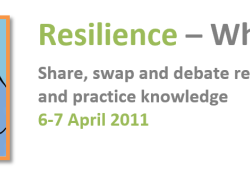Topic: Fostering student resilience: improving perspectives and opportunities for disadvantaged students – Professor Jörg Huber
Resources: You can download Jörg’s slides and you can watch a video of the Forum below.

Session Summary: Inequalities are associated with profound differences in educational attainment and career opportunities. Social and health inequalities go hand in hand: being poorer or coming from a disadvantaged background more generally is associated with inferior physical and mental health; durations of a healthy life and life expectancies are frequently considerably shorter. Resilience refers to successful adaptation in the face of adversity. Attempts at fostering resilience have focused on interventions informed by cognitive behavioural therapy and a focus on the individual; a more contextually sensitive approach focuses on fostering resilient families, groups and communities, informed by ideas coming from social work, social network theory and systemic approaches focusing on families, schools and other ‘settings’ or social entities.
A considerable amount of research shows that inequalities are transmitted from generation to generation, and persist throughout the life-course of individuals. For a number of historical and economic factors, inequalities have increased and are particularly difficult to overcome for those who find themselves ‘at the bottom of the heap’. This pattern can be found in many countries, but is fairly pronounced in the UK. One possible way of intervening in the transmission and persistence of inequalities is to facilitate resilient moves in education and training opportunities. The seminar will introduce and discuss relatively simple and short interventions which enhance utilisation and uptake of opportunities for secondary school and college student. Both studies demonstrate considerable changes and improvements with regards to study practices and identity in students coming from disadvantaged backgrounds.
The discussion will focus on the successes and limitations of the interventions in terms of their success in engendering resilient moves, and their relevance to the UK context, as both studies were carried out in the US. The seminar will end with a workshop activity on generating ideas and plans for similar interventions within UK educational contexts. Plans for a (systematic) review, an intervention study and respective funding may constitute some of the possible outcomes for the event.
Biography: Dr Jörg Huber is a Chartered Psychologist with a longstanding interest and expertise in health psychology, the application of psychology to medicine and health, and research design, statistics and psychometrics. His current research projects focus on diabetes, resilience and wellbeing; physical activity, timing of food intake and obesity; and behaviour change through incentivisation. He has received funding from industry, charities and public bodies. He is a regular contributor at international conferences and advises on a wide range of health issues. He studied psychology in Germany and later the UK (Universities of Konstanz, Bonn and Surrey), and held positions at Universities of Bonn, Surrey, Roehampton and Northampton. Currently he is Professor of Health Sciences in the Centre of Health Research at the University of Brighton. He is also Academic Site Lead for Research Design Service Southeast (RDS SE Sussex).
Who might be most interested: Academics, practitioners, researchers, students, parents, carers, community workers, volunteers, public sector workers, young people and service users.
Key Reading: Oyserman, D., Terry, K., & Bybee, D. (2002). A possible selves intervention to enhance school involvement. Journal of adolescence (Vol. 25, pp. 313–326). doi:10.1006/jado.2002.0474
Stephens, N. M., Hamedani, M. G., & Destin, M. (2014). Closing the social-class achievement gap: a difference-education intervention improves first-generation students’ academic performance and all students’ college transition. Psychological Science, 25, 943–53. doi:10.1177/0956797613518349
This session took place on Wednesday 26 November 2014.
The Resilience Forum is for ANYBODY (with a pulse!) involved with or interested in resilience research!


